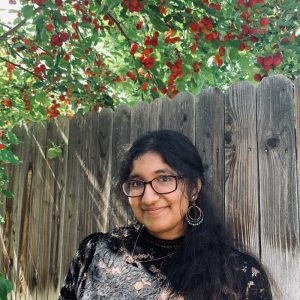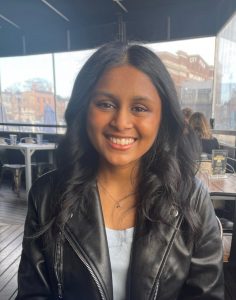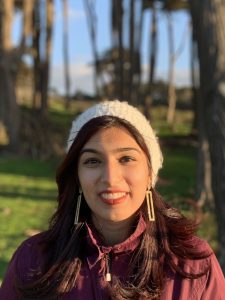Johns Hopkins UniversityEst. 1876
America’s First Research University
Kristin Topel admits that her work can be challenging. She is the executive director of Hopkins Community Connection (HCC), a program that assists Hopkins outpatients who need help with resources — anything from food and housing assistance to transportation and insurance. What’s uplifting for Topel? The Hopkins undergraduate student volunteers who are HCC patient advocates.

“I had experiences where I felt like we were just living crisis to crisis, and it can feel very hard to make improvements in the system,” Topel says. “But being able to work with students who are fully engaged in this work, who go off into their communities or to the next levels in their careers, and understand the importance of supporting these social needs and serving the full person is so motivating and energizing for me.”
True to its name, HCC connects outpatients and their families to community-based services like food pantries and diaper banks and to benefit programs such as WIC and SNAP. The HCC program operates in five outpatient clinics on the Johns Hopkins East Baltimore campus and Johns Hopkins Bayview Medical Center, also in Baltimore. In addition to nine full-time staff and community health volunteers, about 150 Johns Hopkins University undergraduates help screen patients for social needs and navigate a system of some 2,000 potential resources to address them.
“It’s such a privilege for us to introduce this type of work to our students,” Topel says. “What we’re asking of students to do is really serious work of significant importance in the community and to our patients.”
Suma Kotha, a neuroscience major at Hopkins, started with HCC as a patient advocate during the summer before her junior year. She wanted to find a way to connect her pre-med background with the Baltimore community, and HCC became the “perfect combination.”

“HCC has been incredibly eye-opening. I’ve learned that health and medicine are much more than a clinical diagnosis and treatment plan,” Kotha says. “A patient’s health, especially in socioeconomically challenged communities like inner-city Baltimore, is highly impacted and determined by external factors, such as living conditions, access to nutritional food, and general quality of life. Integrating social needs into the health care sphere is a very impactful method of improving overall patient health.”
Kotha, a rising senior, now has a student leadership role in HCC as a resource coordinator. She works to find new community organizations to partner with HCC, updates resource guides, and recommends current partners to Hopkins physicians so they, too, can refer patients to resources.
Navigating those resources isn’t easy, especially for patients without specific identification like a social security card or photo ID, a situation that HCC patient advocate Faiza Shaik faces often in the Comprehensive Care Practice at the Bayview Medical Center.
“For a lot of us, we are privileged enough to reach out and get those documents, but in many cases, it isn’t easy,” says Shaik, a chemical and biomolecular engineering major entering her senior year. “If you don’t have your photo id, you don’t really have a good proof of identity to get your social security card. And if you don’t have your social security card, sometimes that’s a requirement to get your ID. And then alternative documents are needed for proof of residence or a utility bill.”
Shaik says her experience with HCC has taught her the importance of being present for patients. Overall, her time at HCC has been rewarding.
“It’s absolutely been a favorite experience of mine on campus and I’ve learned so much,” she says. “Once you start working with patients, any time that they have a win, it’s definitely a win for you. And any time there is something that doesn’t go as well, you’re there with them in that frustration. I think there are a lot of moments that end up being really memorable.”

Hopkins Community Connection alumna Ria Arora not only has fond memories of the program; she credits it for influencing her career path. A 2021 graduate who majored in cellular biology and minored in Spanish, Arora joined HCC as a sophomore, serving as a patient advocate before moving to a leadership role as a program coordinator in the Children’s Medical Practice at Bayview.
The move was an opportunity to develop her Spanish-speaking skills — the practice serves a significant Latino population — and gain exposure to Latino culture, especially the challenges for Latina women. She says that volunteering in her non-native language was a steep learning curve at first.
“I was very humbled very quickly,” Arora says. “Initially, I viewed language just as a medium to communicate with people. But my time at the Children’s Medical Practice taught me to realize language is a medium for a culture, to learn about people who have different experiences and backgrounds than yours. That was such an enriching experience for me.”
Arora caught on quickly that Latina women feel a heavy burden when trying to meet the needs of their families, needs made even more acute when the pandemic hit in 2020, and patients seeking food and financial assistance doubled.
“Because of how society is set up, they’re really the ones who are the backbone of that work,” she says. “It was a very pivotal point, understanding how communities of color are impacted by an emergency, but it made the work even more important for me to do.”
This past year, Arora was as an AmeriCorps fellow at La Clínica del Pueblo, a Latino community health center in Washington, D.C. This fall, she plans to attend the Johns Hopkins University School of Medicine.
Funding for HCC is limited. Foundations, including Rite Aid Healthy Futures, and federal grants provide some support, and a portion comes from Johns Hopkins Healthcare and Johns Hopkins Health System. Yet the needs continue to grow, especially since COVID-19 relief expired, and individual philanthropy would help to sustain and expand resources. Gifts would fund HCC’s food pantries, ridesharing for patient transportation, a community health worker, and of course, more student advocates.
While the 150 student advocates are not paid during the academic year — they volunteer six to eight hours a week — about 40 of them receive stipends for working in the summer and January. Whether they work or volunteer, they are the same students who will make a difference in the world.
“All 150 of those students who experienced HCC, they’re going to go off and they’re going to make it better,” Topel says. “And I truly feel like they already are.”
Interested in supporting Hopkins Community Connection?
Topics: Alumni, Faculty and Staff, Foundations, Johns Hopkins Medicine, Promote and Protect Health, Strengthening Partnerships, Support Scholars